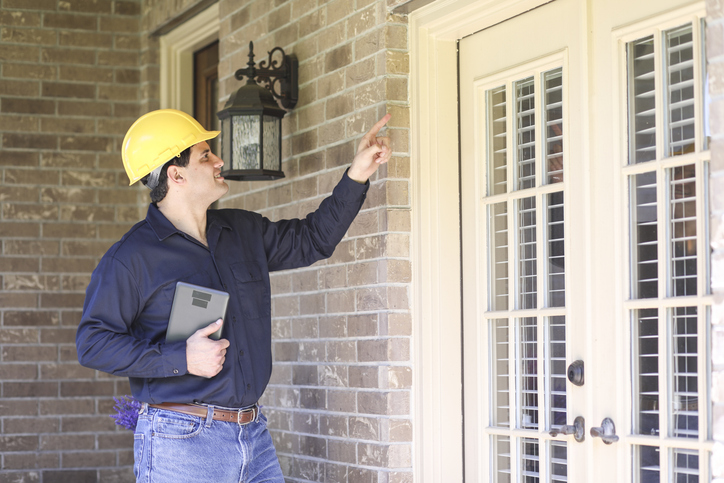
Raise your hand (or pretend you did) if you’ve recently read — and really paid attention to — the words of the Home/Property Inspections and Environmental Hazards section of Paragraph 12 in the Standard Agreement for the Sale of Real Estate (Form ASR). On any given day, we end up surprising a Legal Hotline caller with the extent of what a buyer is allowed to inspect just by electing the first inspection.
What can the buyer have inspected?
Pretty much anything that doesn’t fall under one of the other pre-written inspection clauses. The language of the home/property inspection covers the property and structure itself, as well as environmental hazards. The inspection may be for any, or a combination of, the following:
- Structural components
- Roof
- Exterior windows and doors
- Exterior building materials, fascia, gutters and downspouts
- Swimming pool, hot tub and spas
- Appliances
- Electrical system
- Interior and exterior plumbing
- Public sewer systems
- Heating and cooling systems
- Water penetration
- Electromagnetic fields
- Wetlands and flood plain delineation
- Square footage of the structure
- Mold and other environmental hazards
- Any other items buyer may select (as long as it’s not an item that has been waived in another contingency)
But the buyer can only do one inspection, right?
Wrong. As long as the buyer has the inspections done within the contingency period, they can have as many inspections by qualified professionals as they need to verify the condition of the property. A buyer could have a roofer, an engineer, a contractor and a plumber each do a separate inspection of the roof, foundation, exterior building materials and plumbing system, respectively. It would all fall under the home/property inspection. To be more specific, an appointment to conduct an elected inspection does not count as a “pre-settlement walkthrough.” It’s just a regular inspection, and there is no contractual limit on how many individual inspection appointments can be made.
Then what is a home inspection?
A home inspection, as defined by the Home Inspection Law, is a non-invasive, visual examination of two or more major components of a residential property. If the buyer does not want to hire a separate roofer, engineer, contractor and plumber, they could hire a single home inspector to examine multiple systems to identify any potential material defects.
How invasive is a non-invasive inspection?
The definition of a “home inspection” specifies that it must be non-invasive, and the language of the ASR states that “all inspections shall be non-invasive, unless otherwise agreed in writing.” However, “non-invasive” does not mean that the inspector won’t touch things in the house. An inspector may open doors, run appliances and test systems; they may use technology to see into pipes or behind walls, probe the ground to test water saturation or use a drone to look at the roof. An inspector probably will not move heavy belongings, and they should not drill into the stucco to test for moisture below the surface or pull up floorboards without express permission. In short, they will look at everything they can see without causing damage or destruction to any part of the property unless the parties have agreed otherwise in writing.
Does the inspector have to be certified?
It depends (would it be a legal article if we didn’t say this at least once?). In Pennsylvania, home inspectors are not certified or licensed. However, the law (and the Agreement of Sale) requires a home inspection to “be performed by a full member in good standing of a national home inspection association” or someone supervised by one who meets those standards. The Agreement of Sale goes on to say that any inspections must be done by “properly licensed or other qualified professionals.” Some inspections may require the individual to be certified or licensed, while others may not. Architects (including landscape architects), engineers and geologists are required to be licensed by the Department of State. General contractors may at least have to register with the Office of Attorney General. There are no statewide licensing or certification requirements for plumbers, electricians or HVAC technicians, but there may be local municipal requirements.
That’s complicated. What if I just have Uncle Gary stop by for a quick look instead?
Generally speaking, a buyer who doesn’t comply with the terms of a contingency could lose the ability to exercise any contractual rights under that contingency. Since the inspection contingency states that inspections must be done by “properly licensed or other qualified professionals,” failure to comply with that requirement could mean that the buyer loses the opportunity to negotiate or terminate under the terms of the contingency. So, if Uncle Gary is appropriately licensed or qualified, go for it. But if he isn’t, the seller could choose to consider that a waiver of the contingency and refuse to negotiate (or hold the buyer in default if they try to terminate).
Topics
Member Discussion
Recent Articles
-
Seller’s Property Disclosure: From the Buyer’s Side
- May 9, 2025
- 4 min. read
A lot of education about the Seller’s Disclosure Law is about a seller’s responsibilities. But what are some things that buyers (and their agents) should be taking into consideration when reviewing the Seller’s Property Disclosure Statement?
-
1 in 3 Underestimate Energy Upgrade Costs
- May 8, 2025
- 2 min. read
Despite the cost of energy-efficient upgrades, 90% of those surveyed said they didn’t regret their decision to make them.
-
Home Insurance Rates Rose for 2 in 3 Policyholders in 2024
- May 7, 2025
- 2 min. read
From 2023 to 2024, the majority (35%) said their home insurance rates increased by 5.0% to 9.9%. A considerable 21% said their rates rose 10.0% to 19.9%.
Daily Emails
You’ll be the first to know about real estate trends and various legal happenings. Stay up-to-date by subscribing to JustListed.



